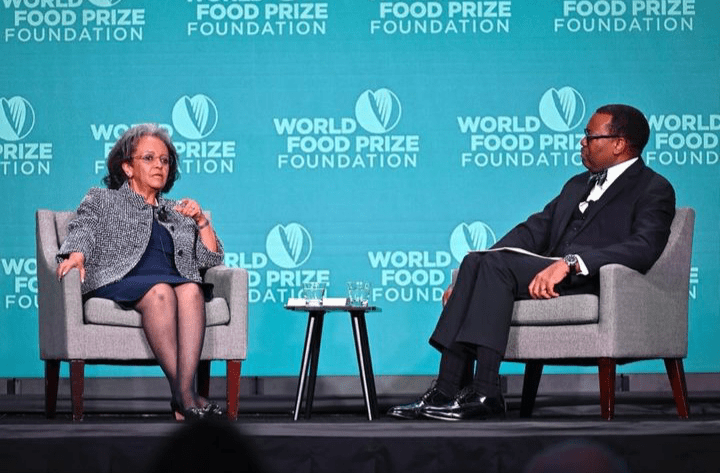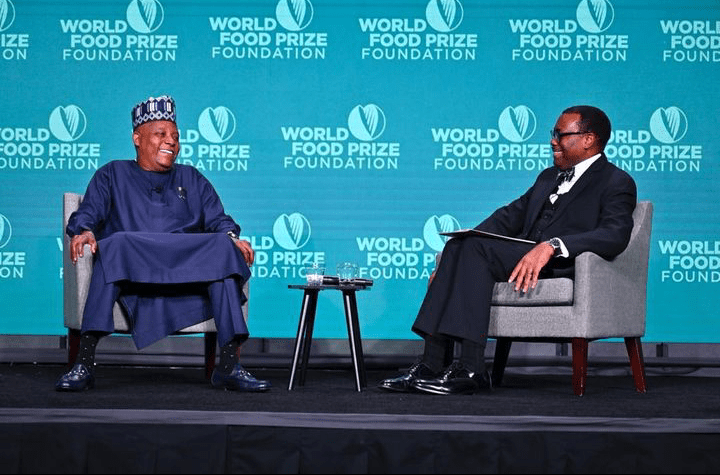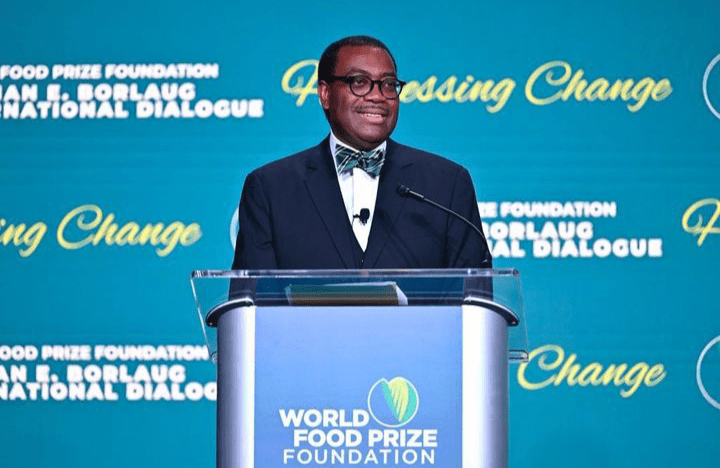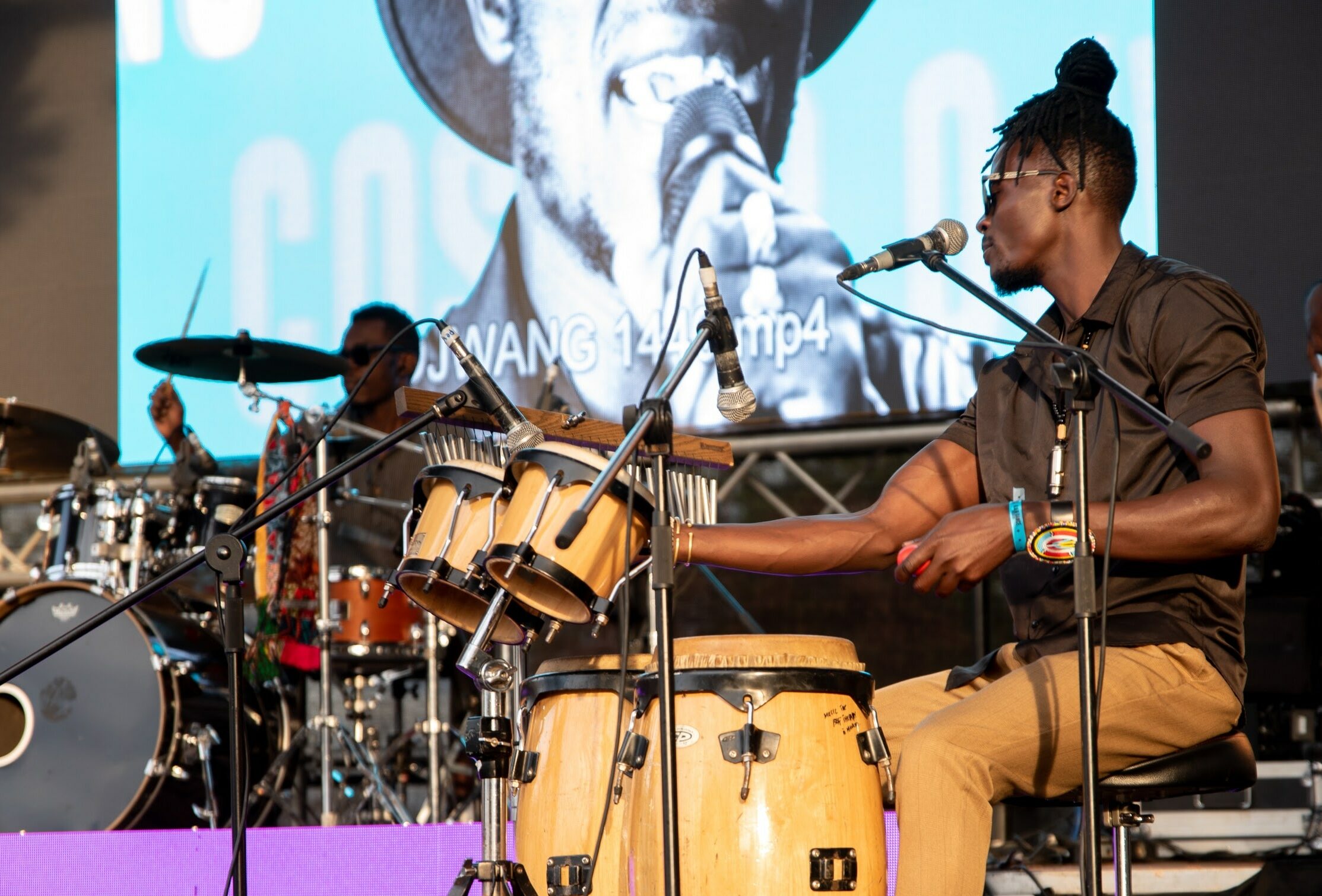At the World Food Prize Foundation’s Norman E. Borlaug Dialogue in Des Moines, Iowa, Dr. Akinwumi Adesina, President of the African Development Bank, shared an exciting prediction: Africa’s thriving food and agribusiness industry is expected to reach a remarkable value of $1 trillion by 2030. This news was met with enthusiasm by the attendees.
The yearly gathering in the heart of American agriculture focused on this year’s theme of “Harnessing change.” Delegates and panelists came together to discuss creative concepts for strengthening innovation, adaptability, and variety, along with methods to enhance resilience, bounce back from setbacks, and develop sustainable systems for feeding the world.
Read also: Heman Bekele, 14-year-old who invented soap to treat skin cancer named America’s Top Young Scientist
Many global leaders are actively supporting increased food production and food security in Africa. They united for a significant global summit called the “Dakar 2 Summit” in January, focusing on boosting agriculture across the continent.

Africa, home to 65% of the world’s untapped fertile land, imports the majority of its food, placing it in a unique situation. African leaders are resolute in their commitment to achieve self-reliance in food production and transform their nations into food exporters. They acknowledge the pressing need to increase agricultural productivity in Africa to meet the rising demand for food due to the global population reaching nine billion by 2050.
The African Development Bank, at the forefront of efforts to address Africa’s food security challenges, actively participated in the Borlaug Dialogue. During a session named “From Dakar 2 to Des Moines” on Thursday, Adesina emphasized the successes of the Dakar 2 summit, a collaborative effort by the Bank, the Senegalese government, and the African Union.
Adesina clarified how 34 African leaders gave their endorsement to country-specific food and agriculture delivery agreements, which generated concrete plans focused on results to guarantee food security and tap into Africa’s entire agricultural capabilities within a five-year timeframe. This approach aligns with the central pillar of the Bank’s Feed Africa strategy, initiated in 2016. He further mentioned that since its launch, the strategy has provided support to over 250 million individuals, resulting in improved agricultural technologies benefiting them.

Adesina revealed that partners had committed more than $70 billion to support the food compacts, and the Bank is preparing to contribute $10 billion over the next five years.
The leader of the Bank emphasized that Dakar 2 underscored the unified determination of African leaders to guarantee that the continent achieves self-sufficiency in food production. President Sahle-Work Zewde of Ethiopia, one of these leaders present at the Borlaug Dialogue, stated, “As African leaders, we are fully dedicated to achieving self-sufficiency in food production. Presently, Ethiopia has achieved a historic milestone by becoming self-sufficient in wheat production and even exporting wheat to neighboring countries.”
Zewde acknowledged that the African Development Bank’s Technologies for African Agricultural Transformation (TAAT) initiative played a crucial role in making this remarkable accomplishment possible. Through TAAT, over 100,000 tons of certified seeds for heat-tolerant wheat varieties were provided, leading to a significant boost in Ethiopia’s wheat production, totalling 1.6 million metric tons in 2023.
Emphasizing the substantial African presence at the Borlaug Dialogue, Vice President Kashim Shettima of Nigeria stressed the significance of leadership, which he considered essential for both nourishing Africa and advancing the continent. He emphasized, “The destiny of a nation hinges on the caliber of its leadership, as it can either lead to its downfall or success.”
During a World Food Prize side event centered on transforming African agriculture through Special Agro-Industrial Processing Zones (SAPZs), Governor Caleb Mutfwang of Nigeria’s Plateau State echoed the importance of effective leadership. He forthrightly addressed the issue of corruption, stating, “The time has come to deal with the elephant in the room, and that is corruption,” he said. “We are serious about this, and we want investors to know that investing in Plateau State is a win-win.” Governor Mutfwang also emphasized the need to motivate investors by streamlining administrative processes and minimizing unnecessary hurdles.
The African Development Bank has dedicated a substantial $853 million to public-sector initiated Special Agro-Industrial Processing Zones (SAPZs) and has effectively rallied an additional $661 million in financing from its co-financing partners. Altogether, these partners are channelling over $1.5 billion into the creation of 25 agro-industrial zones and their associated ecosystems across 13 countries.
Read also: Black Farmer Fund raises $11M to support Black agricultural businesses
Adesina extended an invitation to investors and other stakeholders, encouraging them to invest in the African food and agribusiness sector. He emphasized the robust political commitment in place and pointed to the significant promise demonstrated by results on the ground.

The African Development Bank consistently participates in the Borlaug Dialogue. Akinwumi Adesina, the 2017 World Food Prize laureate, has earned recognition for his exceptional contributions to the African food system. These contributions encompass combating corruption within Nigeria’s fertilizer industry, mobilizing resources to support smallholder farmers, and enhancing crop production efficiency, all of which he successfully achieved during his previous role as the Minister of Agriculture.
The recipient of this year’s Borlaug Prize is Heidi Kuhn, acknowledged for her farmer-centered development approach and her efforts to rejuvenate agricultural lands, enhance food security, bolster livelihoods, and foster resilience in conflict-affected regions worldwide.
Ambassador Kenneth M. Quinn, President Emeritus of the World Food Prize Foundation, and the Foundation’s President, Ambassador Terry Branstad, offered resounding praise for the African Development Bank’s endeavors to address food security in Africa.



